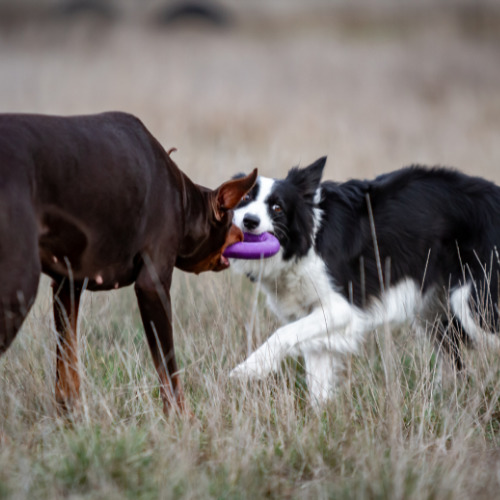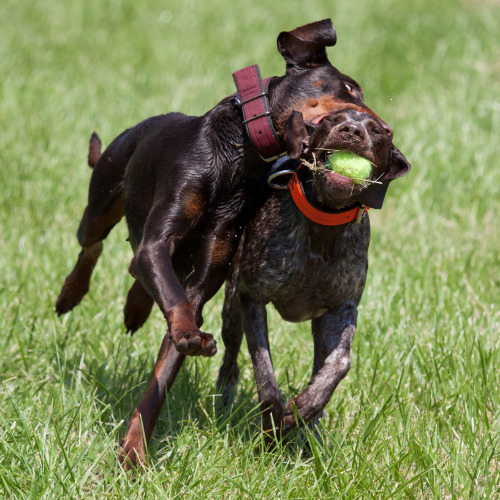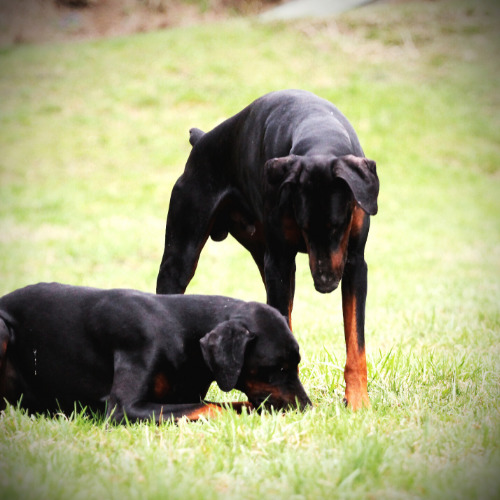Are Dobermans Good With Other Dogs?
March 9, 2022 2022-03-09 10:52Dobermans have an intimidating stature and they are famous for their bold, fearless nature. So, if you’re introducing your Doberman to another dog for the first time or you’re considering adding a Doberman to your dog-heavy household, you’re probably wondering – are they good with other dogs?
Whilst every dog is different and their personalities can vary, every breed tends to have certain characteristics, and there are no two ways around it – Dobermans are dominant by nature. That said, they can be good with other dogs when they are well-trained and well-socialized. Let’s take a look at what causes dog-on-dog aggression in Dobermans and how we can stop or prevent it.
Table of Contents

Aggression in Dobermans
Dog-on-dog aggression is any harmful behavior or threat of harmful behavior by a dog towards another, such as growling or snarling, lunging, and snapping or biting.
There are two types of aggression in dogs; provoked and unprovoked. Provoked aggression occurs in response to provocation; aggression from another dog towards themselves or a family member. This type of aggression is classed as defensive and therefore not usually indicative of any kind of behavioral problem, or something that could result in criminal charges.
Unprovoked aggression, however, is aggressive behavior that occurs when there has been no provocation or threat and it can have serious legal consequences if somebody (or their dog) gets hurt. The most common cause of unprovoked aggression is wrongly perceived threat due to past experiences and/or a lack of training and socialization.
Certain breeds are also known to be more aggressive than others, and the Doberman’s guard-dog DNA certainly causes them to have a dominant streak, resulting in aggressive behaviors towards strangers and other dogs without extensive training, especially dogs of the same sex.

Socializing Dobermans
Socialization allows dogs to observe, learn, and understand the behavior of others, including how to read body language, interpret social cues, and interact with others appropriately.
It is key to dogs being able to discern threatening behavior from non-threatening behavior, and therefore the best way to prevent aggression.
To socialize your Doberman with other dogs, invite other friendly family dogs on shared walks.
It’s best to start in your neighborhood so they can learn the rules in a safe environment – and do it as early on in their lives as you can for it to be the most effective. Make sure to use a well-fitting harness or collar.
Research puppy play date events near you or take your Doberman to doggy daycare, and when you start going out on walks, try to avoid dogs that seem unfriendly.
How to train an aggressive Doberman
Dog aggression has specific triggers, but whether it’s the fear of a previous experience repeating itself or a lack of understanding of social cues, it cannot go unaddressed.
Because of the inherent risk that comes with training an aggressive dog, it is advisable to seek out the help of an in-person trainer. They can assist you in identifying triggers, developing management protocols and training schedules.
Using an experienced hands-on trainer is especially important if your dog is aggressive towards members of your household (both dogs and people) or if you are unable to physically control your dog (e.g. he pulls you over when on leash).
Sudden aggression in Dobermans
If your Doberman has always been good with other dogs but has suddenly become intolerant of them, it could be due to boredom, stress, illness, or old age.
Dobermans are bright, active, and people-oriented dogs, so they get bored very easily. They need a lot of exercise, companionship, and mental stimulation to prevent boredom, and without it, they can get very frustrated and behave destructively towards themselves, the home, and even towards others.
Thankfully, it is easily remedied with some daily lifestyle changes. Dobermans need at least two hours of exercise a day, lots of stimulating play, and lots of family time. To entertain your dog, invest in some challenging toys like puzzles and treat dispensers and play fun games together like hide and seek and treasure hunt. It’s also worth noting that Dobermans shouldn’t be left alone for more than six hours a day on a regular basis. So if you live alone and work full time, they may not be the breed for you.

Stress and anxiety can cause repetitive behaviors like pacing, panting, and tummy upsets, but in severe cases, they can also cause aggression. Specific triggers like separation and phobias can be treated with gradual exposure and positive association training, while stresses related to big life changes, like a death in the family, can be managed with a stable routine, lots of love, and anti-stress products.
Illness, pain, injury, and old age can also make dogs appear to behave aggressively out of nowhere, either because they feel vulnerable, overstimulated, or they perceive a threat where there isn’t one. Such health conditions include sight or hearing loss, arthritis, canine cognitive dysfunction, brain tumors, hypothyroidism, psychomotor epilepsy, hyperkinesis, and neoplasia.
If your Doberman suddenly becomes intolerant of other dogs, especially if they are older, be sure to monitor any other changes in their behavior and make an appointment with your vet if you’re concerned about their health. To prevent aggression towards other dogs in Dobermans that are vulnerable due to illness or old age, reassure them by keeping them close to you when you go out for walks and let approaching owners know that your dog would rather not interact with unfamiliar dogs, particularly if they are boisterous.
If you have any concerns about managing your Doberman’s behavior around other dogs, reach out to an experienced in-person trainer.
The Bottom Line
With the right training, Dobermans can get along well with other dogs, but you need to be willing to put in the work with their training regime. Don’t give up on your dog if they show signs of aggression – and don’t be afraid to consult a professional trainer if necessary.

Laura
Writer and Border Collie Mom
Laura is a dog-lover with an animal-related degree and plenty of hands on experience. She is passionate about dog health & welfare and wants to arm owners with all of the essential info they need!

